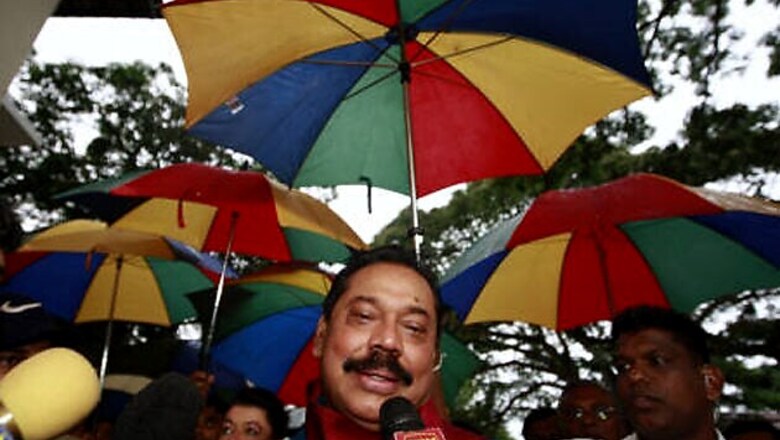
views
Colombo: Sri Lankan President Mahinda's Rajapaksa's ruling coalition on Friday secured a parliamentary majority, election results showed, in his third big win since declaring victory over the Tamil Tigers last year.
Rajapaksa's United People's Freedom Alliance has won 117 seats out of 180 so far decided for the 225-member Parliament, official election data showed. It takes 113 seats to have a majority and form the government.
The full scope of the government's victory, however, will not be known until two areas, where the election commissioner annulled results because of poll violence, vote again.
The election on Thursday was the first since Rajapaksa declared victory in May 2009 in one of Asia's longest-running and bloodiest wars, defeating the separatist Tamil Tigers and returning the entire island to government control after 25 years.
"This is the triumph of democracy. This is a clear restatement of the confidence the people placed in me," Rajapaksa, 64, said in a statement after the results came out.
The president in January rode the war victory to a new six-year term, scoring a landslide victory over retired General Sarath Fonseka, who led the army at the war's climax but later fell out with the president.
Now in military custody facing courts-martial for politicking in uniform and illegal procurement, Fonseka won a parliament seat but will unlikely be able to take it up.
Economic continuity
Friday's results should remove a final question mark for investors eyeing Sri Lanka as an upcoming frontier market, and provide clarity on Rajapaksa's plans for a $42 billion economy targeting 6.5 per cent growth this year.
"Everyone had a wait-and-see approach for the past four months. Now that there is a clear direction in terms of policy, markets are likely to react much more favourably," Samantha Amerasinghe, an economist at Standard Chartered Bank in Colombo, told Reuters.
The Colombo Stock Exchange extended gains into record territory on Thursday, expecting an easy win for the ruling alliance, and is up 165 per cent since January 2009. It was closed on Friday after the president declared a special holiday.
Bond dealers say demand for high-yield government securities should rise, having grown more attractive with upward pressure on the rupee currency.
Rajapaksa appears to have correctly calculated that a resurgent economy and political momentum would get his UPFA close to a two-thirds legislative majority.
"We may be short of 12 or 13 seats to get two-thirds but that will not be a challenge for us," said UPFA spokesman and Transport Minister Dullas Alahaperuma.
Sixteen seats will be decided when the annulled votes are polled again, expected sometime in the next two weeks, and another 29 will then be apportioned to parties based on their nationwide tallies.
Earlier, Anusha Palpita, head of the Department of Government Information, told Reuters the government had won 120 seats.
Opposition cries foul
The main opposition United National Party (UNP), whose coalition has won 46 seats so far, accused the government of misusing state resources, echoing earlier comments the government said were designed to cover up for the opposition's own disarray.
"This is not a free and fair election at all. There was election violence and malpractice on a large scale," UNP General Secretary Tissa Attanayake told reporters, repeating allegations the opposition made after it lost the January presidential poll.
Among those guaranteed seats by winning the most votes in their districts were the president's younger brother, Basil, his eldest son, Namal, and cricketer Sanath Jayasuriya.
Rajapaksa has been vague about the constitutional changes he would make to the constitution. Some speculate he would try remove a two-term limit, or otherwise move to entrench his family's growing political dynasty.
The opposition had vowed to block him, saying his changes would threaten democracy by increasing his already vast powers.
Reconciliation between his Sinhalese ethnic majority and the Tamil minority is also a pressing post-war issue, one Rajapaksa had pledged to address after elections. His coalition has some elements who are against any serious reconciliation attempts.
The president has ruled out devolution or a federal arrangement, a longtime Tamil political demand, and instead offered democracy and island-wide development.


















Comments
0 comment